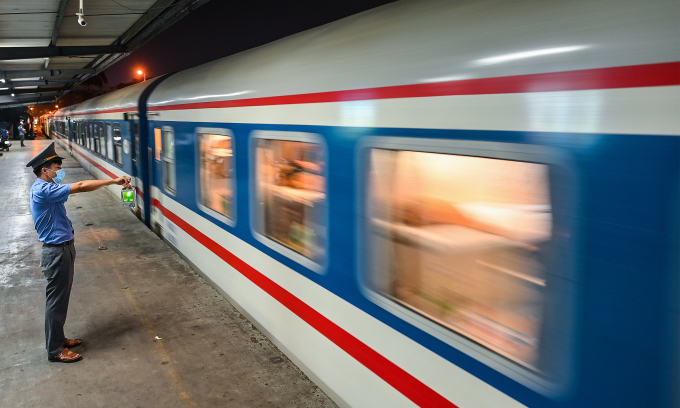3 types of trains to operate on Vietnam’s north-south high-speed railway
According to the north-south high-speed railway project plan, the double-track line will have a standard gauge of 1,435 mm. It is designed for speeds of up to 350 kph, with a maximum operational speed of 320 kph for long-distance passenger trains and 250-280 kph for short-distance trains.
The high-speed railway prioritizes passenger transport but may also carry freight during off-peak hours. Freight trains will run at speeds of 120-160 kph, with an axle load of 22.5 tons. The existing north-south railway will be upgraded for cargo and container transport.
The new railway will pass through 20 provinces and cities, with at least one passenger station in each, beginning at Ngoc Hoi Station in Hanoi and ending at Thu Thiem Station in Ho Chi Minh City.
The average distance between stations is about 67 km, with the shortest section between the northern provinces of Ha Nam, Nam Dinh, and Ninh Binh, spanning less than 45 km.
The project includes 23 passenger stations, 5 freight stations, 5 passenger depots, 4 freight depots, 45 infrastructure maintenance facilities, and 28.5 km of freight connection lines.
According to the consultant’s proposal, passenger trains will operate daily from 6 a.m. to midnight. In Phase 1, eight-car trains using distributed power technology will be employed, with a capacity of 610 passengers per train. In Phase 2, 16-car trains with a capacity of 1,220 passengers will be introduced.
The operator will deploy two types of trains to run throughout the north-south route. The high-speed passenger trains (Type 1) will operate at a maximum speed of 320 kph, stopping only at major stations Hanoi, Vinh, Da Nang, Nha Trang, Long Thanh, and Thu Thiem. The total travel time for the high-speed route is expected to be 5 hours and 20 minutes, with the Hanoi–Nghe An section taking 56 minutes and the Nha Trang–Ho Chi Minh City section taking 71 minutes.
Regular passenger trains (Type 2) will also operate at a maximum speed of 320 kph but will stop at more stations. The total travel time for this service is estimated at 6 hours and 50 minutes, with a stop duration of 2 minutes at each station.
There will also be trains that run shorter routes such as Hanoi–Vinh, Hanoi–Da Nang, Ho Chi Minh City–Nha Trang, and Ho Chi Minh City–Da Nang. Travel times will vary based on the distance of each segment.
Freight trains will operate only when cargo transport demand exceeds the capacity of the existing north-south railway. These trains will run at a maximum speed of 120-160 kph during off-peak hours (midnight to 6 a.m.) to avoid disruptions to passenger train schedules and maintenance activities.
In the initial phase, two pairs of high-speed and two pairs of regular passenger trains will run on the north-aouth route daily, with two pairs of freight trains serving shorter segments. In the subsequent phase, the frequency of regional trains will increase to five pairs per day. Train lengths will be adjusted flexibly between eight and 16 cars to meet demand.
The consultant estimates that the north-south high-speed railway will serve approximately 133.5 million passengers annually on the full route and 106.8 million passengers annually on regional segments.
To ensure affordability and attract passengers, high-speed train tickets will be divided into three pricing tiers. First-class tickets are projected to cost US$0.187/km (VIP cabins with limited stops), second-class tickets US$0.078/km, and third-class tickets US$0.047/km.
For the Hanoi–Ho Chi Minh City route, first-class tickets are estimated to cost VND7.34 million (US$288), second-class VND3.05 million, and third-class VND1.83 million. In comparison, the current north-south ticket prices range from VND900,000 (seating) to VND1.5 million, while bus fares are around VND1.1 million.
According to the pre-feasibility study, the north-south high-speed railway will span approximately 1,541 km, with 60% on bridges, 10% in tunnels, and 30% at ground level with fencing.
The total estimated cost of the railway project is $67.3 billion.


Comments are closed.